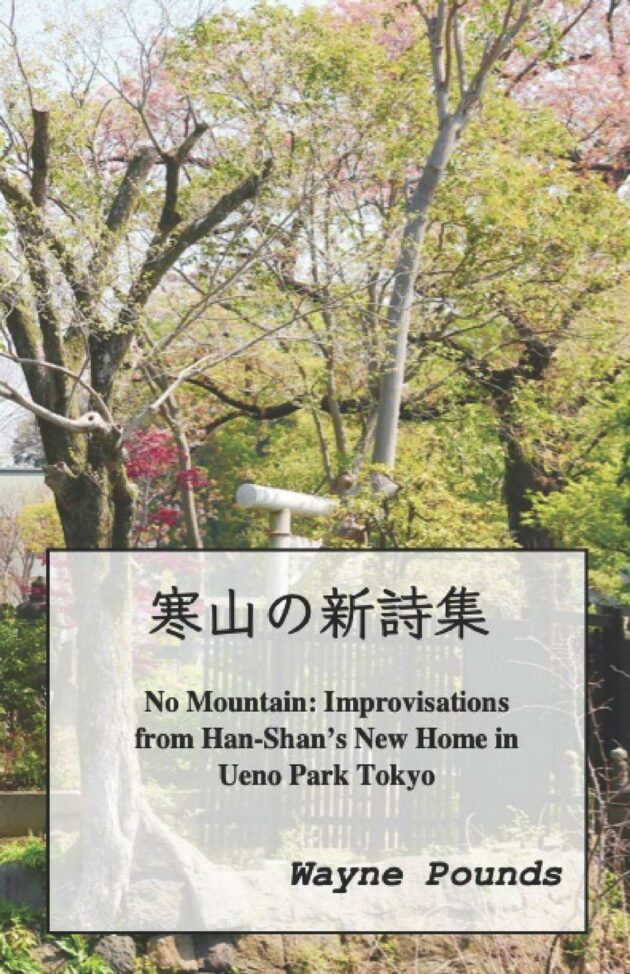
寒山の新詩集: No Mountain: Improvisations from Han-Shan’s New Home in Ueno Park Tokyo by Wayne Pounds, Plan B Audio by Jane Joritz-Nakagawa, Conjurers Dream of Voyages by Jeffrey Johnson, Twenty Villanelles by Preston Keido Houser – reviewed by David Cozy
寒山の新詩集: No Mountain: Improvisations from Han-Shan’s New Home in Ueno Park Tokyo by Wayne Pounds. Amazon, 92 pp., ¥734 (paper).
Plan B Audio by Jane Joritz-Nakagawa. Tokyo & London: Isobar Press, 100pp., ¥2062 (paper).
Conjurers Dream of Voyages by Jeffrey Johnson. Saitama, Japan: Tokyo Poetry Journal Publications / Printed Matter Press, 94 pp., ¥1000 (paper).
Twenty Villanelles by Preston Keido Houser. Amazon, 26 pp., ¥990 (paper).
Whether for a single poem, or a single-author collection of poems, inspiration is offered by different muses. It can come from a place and the history of that place; from a disease and all that living with a disease entails; from travel and the changing vistas that moving from place to place, history to history, presents; from poetic form: the shape that words and lines are given. Recent collections by four Japan-based poets are examples of books that grow from just these seeds.
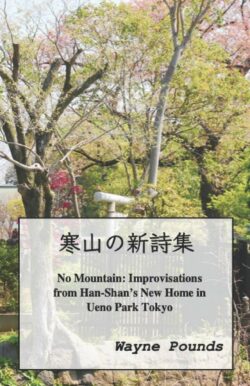
The seed from which Wayne Pounds’s collection, No Mountain: Improvisations from Han-Shan’s New Home in Ueno Park Tokyo, sprouted is Ueno Park, or more specifically Shotenjima, a small island in a pond there on which resides “a statue of En no Gyoja . . . , legendary founder of the Yamabushi,” and also “a broken figure of Koshin, . . . a kind of god or guardian of crossroads and gates” whose cult, “banned in the Meiji Era . . . has died out.” “Into the island’s rich historical broth,” writes Pounds, “I decided to immerse Han Shan, that is insert him imaginatively by giving him a spiritual home there.” Over the next two months, Pounds explains, Han-Shan rewarded him with the fifty short poems that make up this collection.
Pounds, who keeps a respectful distance from Gary Snyder’s powerful translations, gives us a Han-Shan who is, like Snyder’s, irreverent, but takes it a step further by making Han-Shan impudent even toward Snyder’s own cohort:
When I heard in the 50s Jack Kerouac
in The Dharma Bums had made me
the guardian angel of the San Francisco Renaissance
I laughed so hard I had a piss attack
Snyder is nothing if not earnest and his earnestness is there in his superb translations. Pounds’s offerings are more ludic. Explaining the difficulty, for example, of finding one’s way to “No Mountain” and “No Pond,” he describes the pond in Ueno Park: “And you, sir, you could wade across it / and not wet your crotch.”
Pounds is capable, though, of more than inspired irreverence. He captures beauty too:
Benzaiten sole daughter among the Seven Gods
of Happiness, goddess of waters, music, and snakes
plays a lute and waves her magic wand
June’s sitar, drip-drop dropping ragas of rain.
And, as in “The Dead Revisit the Pond,” he can be profound about the mystery of his art:
The poem might come to us in sleep like
The dead who visit the pond at night
It’s a day without words, August.
It might be raining but it’s not.
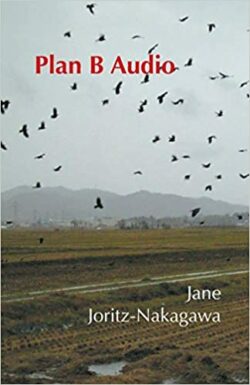
Disease takes us to places we’d rather not go, and it does not guide us to those places we dread in a straight line; the waystations through which the body passes with the illness that passes through the body, are in constant flux. Jane Joritz-Nakagawa captures this flux in her Plan B Audio, a long poem appropriately broken up into a variety of styles and shifting between a variety of shapes.
Entering the poem, unless we know something of the author’s biography, we will be, at first, uncertain where we are. This mirrors entering illness, which is similarly disorienting: it’s just indigestion; I slept on it wrong; I can’t seem to lick this cold. We move into the poem by way of six four-line stanzas. They are filled with unease: “muddled and distorted,” are the words that open the first stanza. In the third stanza we find ourselves at the “edge of a sinister forest / dissolving into darkness,” and in the final stanza we come to a kind of conclusion to this series of quatrains:
to collapse the dystopia
i ate the data
scars that itch
failure of language
The data consumed leads not to greater knowledge—or even, perhaps, to a collapse of the dystopia—but instead points up the limits to expression. The limits of language when confronted with disease is where Joritz-Nakagawa opens her poem.
We become more certain of where we are as the poem progresses. Language remains an issue: “empty words are useless props / restarting the phrases which eat my organs into cheap relief.” With the evocation of organs being eaten we begin to understand that the body is under attack. Later, in a long series of haiku-like tercets, we see that our guess is correct:
entering the hospital
X-ray on a screen
shop of horrors
man with a hacking cough
it must be cancer
private thought
. . .
rustling of uniforms
a beeper goes off
the sound of dying
heavy rain
plum blossoms on concrete
bar code on wrist
. . .
These snapshots take us deep into the sterile unpleasantness that hospitals so often are, a sterile unpleasantness where, in our time and place, bodies attacked necessarily go to find succor.
The narrative continues until the speaker is able to leave the hospital, but she cannot, of course, return to the life she once lived:
we embrace
colostomy bag
separating us.
And as the speaker of the poem moves from illness to hospital to the world outside the hospital the poem continues to take different shapes: a prose poem, for example, and poems with words carefully placed in a way that seems random on the white of the page. The narrative continues, but to call it a narrative, as though it were a first-this-happened-then-that-happened story, does the poem violence. Because it is a poem that pushes form and language to their limits it transcends that kind of simplicity, and as every reader—except, perhaps, Joritz-Nakagawa herself—will encounter pieces that they cannot understand, that cannot be paraphrased and therefore cannot be shoehorned into a story, the poem exceeds any simple organizing principle; that is its great strength.
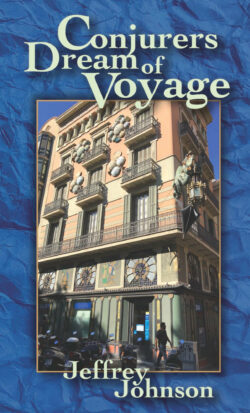
Jeffrey Johnson’s collection, Conjurers Dream of Voyages has five sections: “Departures,” “Arizona,” “Tokyo,” “Spain,” and “Fin.” From the beginning of the voyage—the departure—to the journey’s end, passing from the United States through Japan to Spain, Johnson gives us voyages more concrete than the one Joritz-Nakagawa conjures. Beginnings tend to be muddled, and are often obscured by nostalgia, bitterness, and bitter nostalgia. The good, as every victim of wanderlust knows, is elsewhere, and Johnson’s poems are most alive when he is elsewhere, away from his American beginnings. The first poem in the section devoted to Japan is more arresting than all that came before it:
H
a
l
f
hoped
to find you
sifting through Lake Biwa treasures
the right walking stick
glass shards smooth as stone
another baseball—
but look—
rising over the mountains of June
a harvest moon
The poem is at once Japanese—Lake Biwa is in Shiga Prefecture—but at the same time universal—the harvest moon. It is local without being parochial.
The tercets that make up the poet’s “Sketches of Spain,” in which Johnson foresees his death in various Spanish places are similarly alive: Evoking Toledo, for example, he gives us three lines at the same time simple and rich in history:
Toledo when i die
i will convert to Judaism and pray to Allah
at dawn in your beds of flowers in springtime.
He establishes his kinship with artists who defy convention in the poem that couples death with Antonio Gaudí’s Casa Milà in Barcelona:
Casa Mila when I die
I will gather your seashells, wet my feet
And wait for the tram with Gaudi.
Johnson’s poems are at their best when they are tethered to specific places, and unburdened with polemical intent. One doesn’t doubt Johnson’s sincerity and passion, for example, in “Brigades of Ghosts,” one of the poems in the closing section of the book, but the anger seems to rob the poem of the subtlety we’ve seen, for example, in his “Sketches of Spain.” We read about victims of war, “facing flames of fearful fate / in the fangs of dogs of war / at the hands of youth of another land / who like you find themselves / trapped in obligations / not to soil lineage / but the expedient lies / of businessmen in towers / and idealogues quite insane . . . .” A good polemic is a joy to read, but for all the righteous fury these words contain, this poem that wants to be a polemic fails as polemic and as poetry.
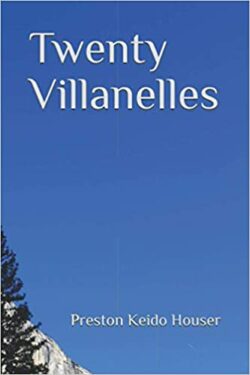
The starting point of Preston Keido Houser’s Twenty Villanelles is clear from its title. Rather than beginning with a place as Pounds does, an experience as Joritz-Nakagawa does, or movement through places and time as Johnson does, he begins with one of poetry’s most intricate and enticing forms, the villanelle. For those of us who’ve forgotten, it’s easy enough to google “villanelle” and read, for example, at Wikipedia, that a villanelle: “ . . . is a nineteen-line poetic form consisting of five tercets followed by a quatrain. There are two refrains and two repeating rhymes, with the first and third line of the first tercet repeated alternately at the end of each subsequent stanza until the last stanza, which includes both repeated lines.”[1] One might, with a bit of effort, be able to imagine the beast evoked in that crowd-sourced description. It is much easier, however, to grasp what we are dealing with, and to understand Houser’s achievement, by looking at one of his poems in its entirety:
What’s left after leaving leaves few lessons to learn
No sign nor crumbs to point a way home
Take to the wild with no thought of return
Surviving elders denounce a disastrous concern
Confront an ancient battlefield to clear and comb
What’s left after leaving leaves few lessons to learn
Captive youth given no reprieve but to yearn
To demolish the colonies of glass and chrome
Take to the wild with no thought of return
Bivouac in forest between fire and fern
Consult the stars for the next day’s roam
Take to the wild with no thought of return
With no border behind nor abode to burn
The mind ahead becomes a panoptic dome
What’s left after leaving leaves few lessons to learn
Take to the wild with no thought of return.
In this poem—and I could have chosen any of the poems in Houser’s collection—one sees the fractal-like richness to which the form can give rise. The skill with which single lines are crafted is compelling—the alliteration in the first line, the anapests in the third line—and there are stanzas, like the first, that could be poems on their own. The repetition of first and third lines throughout a villanelle in different contexts, both sonic and semantic, gives us a whole more satisfying even than its very satisfying parts.
There is more, though, to Houser’s poems than skillful use of a form; he uses his chosen form to make arguments that are often passionate and range from politics to Buddhism to getting through the day-to-day. Of course, the three are inextricably connected as we see in the poem that begins, “In confrontation exercise extreme caution,” and ends, after having employed these two lines in the intervening four stanzas, “Finally compassion the only viable option.” We see the political in Houser’s opposition of the compassion introduced in the opening stanza with “a culture of callous corruption.” We see the difficulty of daily existence in, “After ceaseless struggle inevitable exhaustion,” and again that stanza concludes, “Finally compassion the only viable option. Houser’s dedication to this option derives, one suspects, from his interest in Zen Buddhism which, we are told, is one of the things that brought him to Japan.
From an island in Ueno Park’s Shinobazu Pond to cancer invading a body to Spanish avant-garde architects to exquisite formal creations that are as hard-hitting as news and death: poems sprout from all these places, and all these places have moved through Japan. May this fertile flourishing continue.
[1] Wikipedia contributors, “Villanelle,” Wikipedia, The Free Encyclopedia, https://en.wikipedia.org/w/index.php?title=Villanelle&oldid=1038340478 (accessed September 9, 2021).

David Cozy has been KJ’s Reviews editor for over a decade, since KJ76.